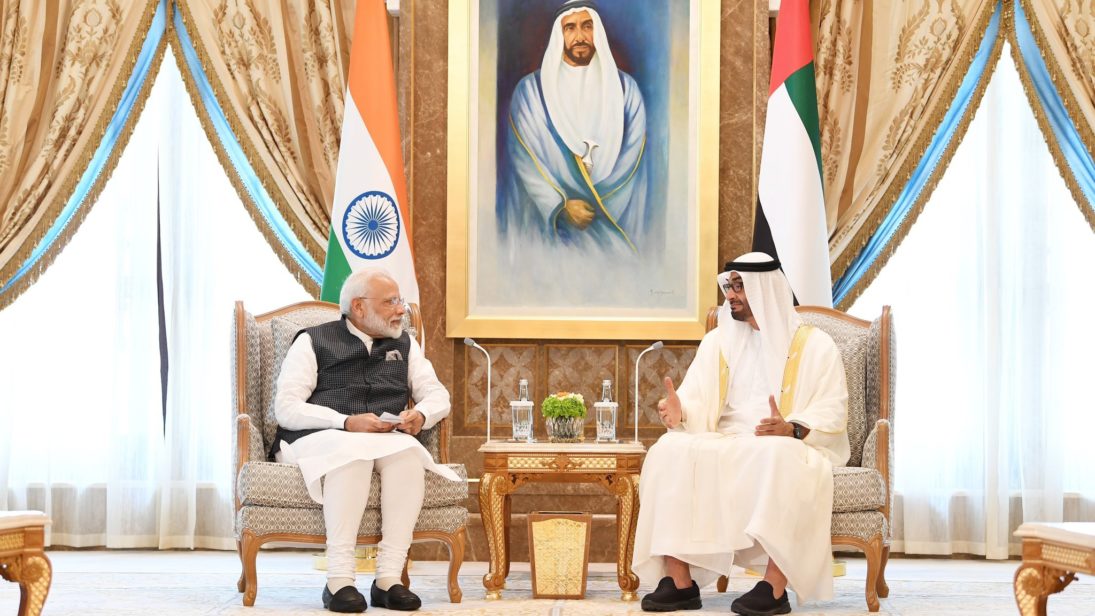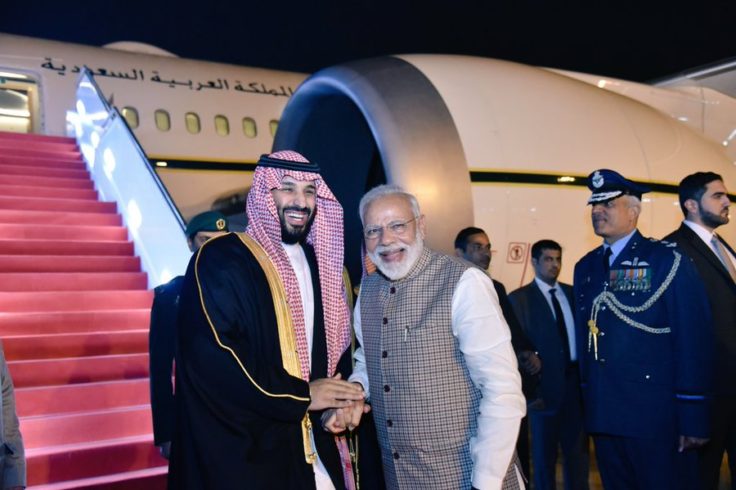
Riding on India’s growing status as an economic and aspiring military powerhouse, the Modi administration has deftly increased its diplomatic engagement with the Gulf region, particularly in the UAE and Saudi Arabia. One factor that has underpinned India’s connection to the region has been its diaspora population of over 8 million in Gulf Cooperation Council (GCC) states – Saudi Arabia, the UAE, Qatar, Bahrain, Kuwait, and Oman – with Indians making up over a quarter of UAE’s population. This significant diaspora population has been instrumental in fostering cultural, educational, and business connections.
Further, the Modi administration has made stronger ties with the Gulf a key part of its foreign policy. In six years, Modi has embarked on more visits to Middle East countries than his four predecessors combined. Many of these visits saw him addressing large crowds of India’s diaspora population, such as in the UAE, Oman, and Bahrain. These ties have reaped benefits for India as Gulf nations have slowly moved from a pro-Pakistan position to a more neutral one vis-à-vis the India-Pakistan conflict, particularly over Kashmir. For instance, both the UAE and Saudi Arabia remained neutral or even supported the Indian government after its withdrawal of Article 370 from Kashmir despite Pakistan’s vehement protests against the move.
The warming ties between India and GCC countries have carried over through the COVID-19 pandemic, when India provided medical supplies and guaranteed food supplies to the Gulf nations. However, the pandemic has also exacerbated fault lines within these ties due to an increasingly vociferous section of non-resident Indians (NRIs) expressing virulent anti-Muslim views on social media. Expressions of hatred against Muslims by Gulf-based Indians has elicited criticisms not just of these hate mongers but also of India’s domestic policies, an issue that may cause a longer term strain in India-GCC relations.
Expressions of hatred against Muslims by Gulf-based Indians has elicited criticisms not just of these hate mongers but also of India’s domestic policies, an issue that may cause a longer term strain in India-GCC relations.
Hate in the Time of COVID-19
In India, as elsewhere, the COVID-19 pandemic has deepened some pre-existing societal schisms. In India, one of the most prominent examples was the vilification of Muslims after a gathering of the Tablighi Jamaat in New Delhi in the middle of March, which was later linked to a spike in cases of COVID-19. Some news outlets were quick to demonize Muslims and a myriad of uncorroborated reports (later debunked as fake) emerged claiming Muslims were engaged in nefarious schemes such as spitting on food, licking utensils, or throwing COVID-19 infected money on the floor to infect Hindus. This spread into social media with a proliferation of tweets and posts sharing fake news stories often accompanied by hashtags such as “corona jihad.”
This communalization is not uncommon. However, it has now directly impacted India’s soft power in the Gulf – a region where the relationship between India’s diaspora population and Gulf authorities has generally been positive. Recent Islamophobic tweets and posts on social media by Indians living in GCC countries have sparked outrage in the online spheres and media portals of these nations. Arab netizins, scholars, and even royals such as Princess Hend al Qassimi from the UAE, have begun condemning online hate speech and warning Indians against following in the footsteps of these individuals. For instance, one scholar argued that all extremists from India should be listed in the Gulf. Many have criticized not only the statements by NRIs in the Gulf, but prejudice against Muslims within India in the wake of communal clashes in Delhi, with the Organization of the Islamic Conference (OIC) putting out a recent statement condemning Islamophobia and violence against Muslims in India. Additionally, countries like Kuwait have begun lobbying the OIC to speak more for Indian Muslims.

Impact on India-Gulf Relations
While statements from Gulf countries and discontent on social media may not immediately hamper India-GCC ties, they do represent fault lines in an otherwise positive relationship. For one, public figures have not generally focused on India-related problems in the Middle East, and Gulf countries have been less concerned with human rights in India. Importantly, that royals have spoken on these matters is a sign that criticizing India’s recent domestic policies has some tacit approval from elites in an otherwise tightly-controlled censorship environment. Finally, while prominent voices are still small, there has been a buildup of online influencers in the Gulf advocating greater actions to curb discriminatory posts on social media, with hashtags such as “send Hindutva back home.”
Ultimately, these fault lines may not immediately motivate censuring these individuals as a matter of national policy – although several Indians working in GCC countries have been fired from jobs due to posting Islamophobic views online. With the UAE government currently reviewing labor agreements with many countries including India due to lack of cooperation in repatriating respective citizens who lost their jobs during the pandemic, India appears to be taking the complaints of online hate speech among its population in the Gulf seriously.
One day after the OIC statement, Prime Minister Modi appealed to Indians not to divide along lines of caste or religion in a rare tweet given an otherwise verbose account that largely skirts around Islamophobia in India. This was followed by India’s ambassador to the UAE explicitly cautioning Indians against discriminating abroad. Moreover, both Modi and Foreign Minister S. Jaishankar launched a diplomatic offensive to contain the fallout from Islamophobic tweets, highlighting the extent to which the issue has risen to the highest levels of diplomatic relations.
The debate also represents a broader reduction in India’s soft power in the Arab nations over the last several months. Criticism from the OIC – which has at times been rebutted by India – has addressed protests against the Citizenship Amendment Act, the Delhi riots in February, and the current atmosphere of Islamophobia. The potential weakening of India’s soft power, however, does not necessarily indicate fractures in the broader India-GCC political and economic relations, which are driven primarily by realpolitik concerns. During tense situations that cause outrage among residents of the Arab nations, it is natural for these nations to issue or endorse statements in order to pacify local populations.
India cannot afford to underestimate this issue, given that it increasingly features in debates in the Arab (as well as Western) world regarding the rights of Muslims. Fallout over these issues may be exploited by India’s detractors such as Pakistan, to score political points and erode India’s image in the Gulf.
Yet, India cannot afford to underestimate this issue, given that it increasingly features in debates in the Arab (as well as Western) world regarding the rights of Muslims. Fallout over these issues may be exploited by India’s detractors such as Pakistan, to score political points and erode India’s image in the Gulf – as seen in the case of Pakistani users reportedly creating fake Twitter accounts of Gulf-based influencers to further sway public opinion against India. Although India is likely a long way from strategic setbacks in its Gulf relations, a sustained negative opinion threatens its future public diplomacy in a region where its large diaspora population should give it a soft power advantage.
Remedial Steps
While the current debate stems from the COVID-19 chaos, this episode is reflective of online hate speech that has been ongoing for many years now. While India has taken some steps to address the concern in the Gulf, it can do more to distance itself from anti-Muslim views expressed online and reengage with soft power in the Gulf. For instance, India could make use of its various cultural centers in Gulf nations where Indian expats are well connected and networked. Moreover, India could periodically issue remainders and notices to Indians who live abroad to refrain from engaging in spreading hatred online (and offline). Ultimately, it is up to the Indian government to ensure that such voices are to be discouraged if it wants to maintain its standing and a positive image within the Gulf nations.
***
Image 1: PMO India via Twitter
Image 2: MEA India via Twitter


